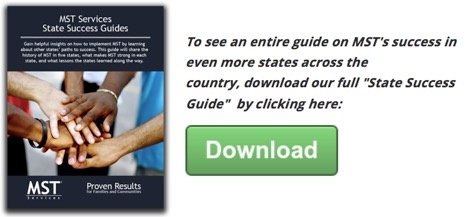How MST Came to Connecticut
In the late 1990s and early 2000s, the state of Connecticut was grappling with a challenge that is quite familiar for state officials: many of their youth programs were not effective. In 2004, a report found that Connecticut’s services provided were often making youth worse off than they were prior to treatment. As a result, the Court Support Services Division (CSSD) began investigating alternative programs.
At that time, there were a few MST providers operating in Connecticut, and CSSD quickly identified MST as an effective treatment for youth. They decided to invest heavily in MST in Connecticut, launching 15 MST teams in just 18 months. It was a huge initiative, but by focusing on relationship building and communicating the effectiveness of MST, the state made the endeavor a success.
MST Champions
Pete Panzarella, the statewide director for substance abuse services for DCF, played a crucial role early on by helping start the initial teams in Connecticut. Equally as important to the development of MST was Julie Revaz, with the judicial branch of CSSD, who was another early champion of MST.
Their early advocacy of MST set the stage for a sustained interest by the state in the program. As a whole, the state is very supportive of and invested in evidence based programs for youth, and highly values MST in Connecticut due to its emphasis on data monitoring and quality assurance.
“It was easy to champion MST. Once I finally made the conceptual commitment to it, I began to see the proof that this parent-focused intervention with its resultant sustainability is an effective remedy for addressing the complex needs of children in our system. And, most importantly, it’s what I’d want for my daughter if she were to find herself in the spot that so many children do.”
- Julie Revaz, Connecticut Judicial Branch
Strengths of MST in Connecticut
State stakeholders have developed a strong interest in learning about the model and engaging with the MST process. Officials from funding agencies often attend Program Implementation Review meetings, during which MST experts and provider leadership discuss the strengths and challenges of implementation. State stakeholders learn from experts and gain insight into outcomes, and can help set and evaluate goals for the MST program.
The state also holds quarterly meetings to bring together all the MST providers, as well as stakeholders from both the Court Support Services Division and the Department of Children and Families (“DCF”). These meetings allow teams to share data and testimonials about their successes, and help state officials understand the impact of MST. Through these meetings, agencies have developed a strong network of support with other providers as well as the funding agencies that contribute to the continued success of the MST program.

MST in Connecticut: Lessons Learned
Connecticut took on an ambitious project in launching many MST teams at once. The initiative required substantial resources and resulted in significant change. Connecticut proved that it is possible to implement a large-scale project successfully. Much of their success hinged on developing strong relationships. To foster the necessary trust, state officials implemented transparent Program Implementation Review meetings, which allowed providers and funders to share information and build rapport. MST supervisors often hold office hours in the Department of Children and Families as well as in probation offices. These regularly scheduled sessions make it easier for stakeholders to interact and form important bonds.
Another lesson learned from Connecticut’s experience is the benefit in proactively generating interest and enthusiasm in the MST program. MST stakeholders have prioritized sharing the successes of the program. Last year, the program held a statewide celebration that brought together all the MST stakeholders, as well as MST families who have benefited from the service. The stories and experiences shared by the families and stakeholders provided a powerful testimony to the impact of the program.
If you know of someone that would benefit from MST or you would like to start an MST program in your area, please click here.



